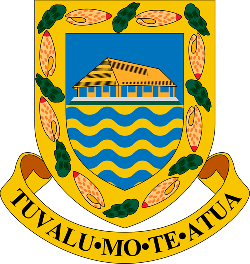Keyword Search
Type
Topics
Results
Project
Preparation of Third National Communication (TNC) under the UNFCCC
In relation to many SIDS, Tuvalu is extremely vulnerable to climate change and its impacts. Given that communities are very much aware of global warming and its damaging effects, they still continue to fight for their survival and future better livelihood. In every Conference of the Parties (COPs) and other Climate Change dialogues, Tuvalu continuously expressed a common phrase that “if you save Tuvalu, you save the world”. This is the Prime Minister’s impassioned phrasing challenging the parties to meet their obligations under the UNFCCC and its protocols. Ratifying the UNFCCC and its protocols including the Paris Agreement was part of Tuvalu obligation towards addressing climate change impacts.
Generally, Tuvalu signed and ratified the United Nation Framework Convention on Climate Change (UNFCCC) on 8th June,1992 and has also ratified the Kyoto Protocol and the Paris Agreement. Having identifying detrimental environmental concerns such as coastal erosion, salt water intrusion and drought, it built efforts to develop its National Environmental Management Strategy (NEMS) in 1997, the National Adaptation Program of Action (NAPA) in 2007 and other new climate policies and strategies to ensure policy actions are effectively in place as well environmental and socioeconomic safeguards including gender are respectfully realized and implemented.
Project
Project Coordinator : Mr. Tomu Hauma
Since 2015, under the sponsorship of the New Zealand Government, the Strengtening Water Security of Vulnerable Island States Project (shortened for the Water Security Project) started off in five island countries - Cook Islands, Kiribati, Republic of the Marshall Islands (RMI), Tokelau and Tuvalu. The project was particularly ignited by the 2011 drought epidemic in Tuvalu and thus developed to not only address impacts of drought in the five island countries but to also at least support and resolve other hazards on drinking water and its supplies. Such support has to be address through the project team efforts and the existing network of water related institutions on each of the five island countries. Thus both the Government and Civil Societies have their own part to play in the mix of addressing water problems in each of the five implementing countries. The project is regionally coordinated by the SPC, and implemented at the national level by each of the five island countries.
Project
topography, size, geographical remoteness and access to resources. Despite these challenges, it has become a leading voice for enhanced climate mitigation regionally and globally. Tuvalu is now developing a national adaptation planning process (and NAP) that will form a sustainable platform for future adaptation investments.
Project
Pacific Adaptation 1 to ClimateChange and Resilience Building (PACRES) aims to ensure better regional and nationaladaptation and mitigation responses to climate change challenges facing Pacific ACP countries.It is being implemented by the Secretariat of the Pacific Regional Environment Programme(SPREP), the Pacific Islands Forum Secretariat, the Pacific Community and theUniversity of the South Pacific.PACRES is supporting regional and national climate change portals to increase access toand reach of climate change and disaster resilience information. This includes contributing toongoing maintenance and support of regional and national knowledge management portals,which are critical to their long-term sustainability.
Project
Climate change is a fundamental cross-cutting issue that undermines Tuvalu socio-economic development efforts. Tuvalu’s climate change priorities are articulated in the recently approved Te Kete Sustainable Development Strategy 2021-2030, national climate change policy, sectoral policies as well as in legislation such as the Tuvalu Climate Change and Disaster Survival Fund Act and Regulations. As indicated in the NDC, Tuvalu commits to a reduction of emissions of greenhouse gases from electricity by 100% by 2025. Emissions will be reduced from all other key sectors including Agriculture and Waste, conditional upon the necessary technology and finance. An updated climate change strategy is currently being prepared.
Project
The overall goal of the Programme is to increase the resilience of populations in the CookIslands, Niue, Palau, the Republic of the Marshall Islands (RMI) and Tuvalu to climate changeand climate-related hazards, through the delivery of timely, accurate and actionable climate andocean information and early warnings to facilitate climate-resilient policy, planning,preparedness and response actions.The Programme will establish integrated climate and ocean information services and multihazardearly warning systems (MHEWS) in five Pacific Small Island Developing States (SIDS):Cook Islands, Niue, Palau, RMI and Tuvalu.
Project
The Tuvalu Integrated Water Resource Management Project focuses on the atolls of Funafui, Niutao, Nanumea and Nanumaga working on developing drought management plans, creating water and sanitation plan, and collecting data and producing a toll to enable accurate forecasting of water shortages and drought information.
Resource
This National Adaptation Plan (NAP) Framework has been developed to provide strategicguidance to Tuvalu’s NAP process. The NAP Framework draws on a culmination ofassessments, including the findings of the integrated vulnerability assessment, detaileddesk review, and stocktake of legislation, policies and plans relevant to climate changeadaptation.
Event
This is a show-and-tell event conducted by the IWRM Project. The IWRM Team will brief the CCD Team on the water survey that will carried out on Friday 12th April to islets of Funafuti.
Job / Tender Opportunity
Job / Tender Opportunity
Resource
1.1 Project background
The project, ‘Managing Coastal Aquifer in Selected Pacific SIDS’, is supported by the Global Environment Facility and is being implemented by UNDP and executed by the Disaster and Community Resilience Programme (Geoscience Energy Maritime Division) of the Pacific Community (SPC) in the Republic of Marshall Islands, Republic of Palau, and Tuvalu. The four-year (2021–2024), USD 5.2 million project aims at improving the understanding, use, management and protection of coastal aquifers towards enhanced water security, including in the context of a changing climate. More specifically it aims at 1) identifying the extent, threats and the development potential of groundwater resources, 2) increasing awareness of groundwater as a water security supply source, 3) providing options for improved access to groundwater and 4) and improving aquifer protection and management, within Pacific Small Island Developing States.
1.2 Mission objectives and outcomes
